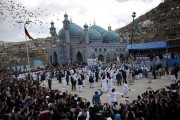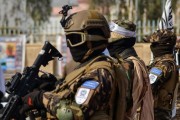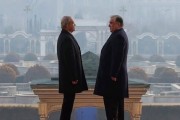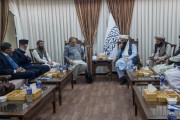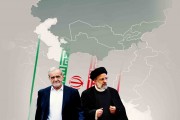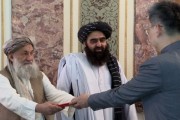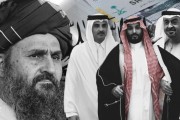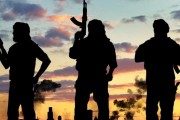Publish Date
Saturday 5 November 2022 - 13:39
recommended
1
US and the issue of Afghanistan: from withdrawal to planning
After the American withdrawal from Afghanistan and putting an end to the occupation of this country, one of the most important issues is the position of Taliban's Afghanistan in the foreign and security policy of the United States. Although there are many priorities and ideals in America's foreign policy, it should be noted that US looks at the issue of Afghanistan based on its priorities, not its ideals. Because if America's concern in Afghanistan were issues like peace, democracy and development (the ideals of American foreign policy), it should have handled them with a different manner. However, Afghanistan under Taliban’s control can serve the interests of the US foreign policy in different ways and overlap with the priorities of this country. In this framework, the United States has planned to exploit this new situation and makes decisions and acts based on it.
By: Seyed Ahmad Fatemi Nejad
About a year ago, America ended the occupation of Afghanistan after two decades and left this country. Regardless of the approaches and analyses that have been discussed and are still being discussed about the reasons and consequences of America's withdrawal, the main concern now is what the position of Afghanistan under the Taliban's rule is in the foreign and security policy of the United States. More precisely, what approach has the US adopted towards Afghanistan after withdrawing its troops from the country, and what position does it consider for Afghanistan in its foreign and international policy decisions? To answer this question, we must first review the priorities of American foreign and security policy and then check how Afghanistan is related to these priorities and at what point it can overlap with the interests of the United States. We will examine these issues in the following section.
In the American foreign policy, a distinction must be made between ideals and priorities. Because America has traditionally defined issues such as peace, development and democracy as the ideals and goals of its foreign policy and it has based its soft power on this basis. More importantly, the United States desires the rest of the international community to see and interpret its strategies in this way. But in recent decades, as we move towards the present time, the priorities of the US foreign policy have moved away from its ideals and goals, and it has been a long time that a significant part of analysts especially non-Americans, no longer see the country's foreign policy as peaceful and democratic. On the contrary, the foreign policy of this country has increasingly moved towards unilateralism, imperialism and militarism. Therefore, the main priorities of American foreign policy in recent decades and years can be listed as bellow.
1) Permanence of hegemony: after the Second World War and especially after the Cold War, the main priority of the American foreign policy has been to maintain and continue its hegemony, and at different times it has taken advantage of different tools for this purpose: Sometimes it has united the Western Bloc against the threat of the Soviet Union; sometimes it has emphasized the threat of terrorism and Islamic extremism; and today it has highlighted the China challenge. By this measure, America has practically divided the rest of the international actors into two groups of supporters and opponents, and has dealt with them accordingly.
2) Dealing with challengers: In continuation of the above mentioned priority, America has dealt with actors who challenge its hegemony in different ways. There are two categories of challengers to the American international policy: the group that creates limited (not fundamental) challenges; and actors who have the capability to create fundamental challenges and even replace America in international hegemony. America's approach in dealing with the first group has been pressure and punishment, and with the second group, blockade and balance. Actors such as Cuba, Venezuela, Islamic Republic of Iran, and so on are among the first range of challengers; and powers such as the former Soviet Union and today's China, are in the second category.
3) Managing allies: In its foreign policy, America not only does focus on its enemies and opponents, but also it does not ignore its allies. More precisely, one of the priorities of American foreign policy to maintain its hegemony is to prevent its allies from moving away from US or adopting independent approaches. Even if America's allies do not do these things, the White House has tried in many cases to impose the cost of its policies on the allies and make them involved too.
4) Dealing with non-governmental narchists: America knows that not only the traditional actors of international relations, i.e., governments, can challenge its position and its desired order, but also non-state anarchists (including terrorists and resistance forces) have this ability too. Therefore, it is not in vain that one of the main priorities of American foreign policy is to deal with insurgency in the international environment. In particular, the US is concerned that the governments that challenge the United States will want to use these non-governmental anarchist groups.
5) Relying on economic tactic: Using economic tool and maintaining the effectiveness of it is one of the main priorities of American foreign policy. Wherever the military tool fails in American foreign policy, the economic tool comes to its aid. This tool has been used not only in relation to the opposing and competing actors of America, but it has also been sometimes used in the case of allies (the most prominent instance of which is the current situation of Europe regarding the Ukraine crisis and how America is dealings with them).
6) Legitimization/de-legitimization of international institutions: Finally, one of the most prominent priorities of America is to create institutions and introduce them as neutral actors in order to continue its hegemony at the international level. These institutions help the United States to gather its allies and sometimes even its opponents under a single umbrella, in order to shape its desired order. More importantly, whenever the United States considers the functioning of an institution against its interests, it tries to weaken and even dissolve it.
Although the priorities of American foreign policy are more than the ones mentioned above, the most important of them were tried to be reviewed here. Before looking at Afghanistan's position in America's international policy based on the mentioned priorities, it should be noted that America looks at the issue of Afghanistan based on its priorities, not its ideals. Because if America's concern in Afghanistan were issues such as peace, democracy and development (which are the ideals of American foreign policy), it should have handled them with a different way. For instance, today we observe that in issues such as demanding democracy in Afghanistan, people's rights and especially women's rights in the country, the resistance front against the Taliban, the Taliban’s failure in providing security for the Shiites of Afghanistan, the development of the country under the Taliban's rule and so on, the United States is somehow indifferent, if not completely inattentive. So if Afghanistan today has a place in American regional and international policy, it is influenced by Washington's foreign policy priorities, not its abstract ideals and goals. Now it should be noticed that through which priorities and how Afghanistan under the Taliban rule can help America’s interests. It is natural that America's approach to Afghanistan will be determined based on this.
1) Bringing neutral and reluctant actors together: Afghanistan under Taliban rule is a stimulus to bring neutral actors together in this region, considering the threats it can pose to its neighbors and surrounding actors. It seems that India and Central Asian countries are good targets for this tactic. During the last year, negotiations and consultations of India and some Central Asian countries (such as Uzbekistan) with the US have increased, especially over the security issues of the region.
2) Displaying operational power: Although America has withdrawn from Afghanistan, it is aware that this country is in the neighborhood of China and Iran - two outstanding challenges of America’s foreign policy - and close to Russia's sphere of influence. Therefore, the existence of a type of government in Afghanistan that lacks international legitimacy (which provides the possibility of effortless intervention), gives the US the opportunity to launch military operations there if needed (like targeting Ayman al-Zawahiri in Kabul). Such operations, on the one hand, give legitimacy to Washington and show that it is still fighting terrorism, and on the other hand, it is a warning to America's rivals and shows that America still has the ability to conduct military operations near their mainland.
3) Highlighting the weakness of the allies: America's withdrawal from Afghanistan, which happened almost without coordination even with its allies, forced America's allies to leave too. This point, along with other ones, showed America’s companions that without the presence of the US, they are not able to continue their presence in Afghanistan and all their declared and non-declared goals are under the shadow of the White House's desires. This situation can help America to keep its allies with it.
4) Reviving the stronghold of extremists: The presence of Ayman al-Zawahiri and some other Al-Qaeda leaders, along with numerous reports and signs of the presence and activity of Islamic State of Khorasan Province (ISKP) in Afghanistan, show that this country can once again become a heaven for terrorists and extremists. This will help anti-American anarchists to settle down in one place, and make it easier for Washington to track them. In this way, the United States can both achieve the above-mentioned goals with its drone operations (which were discussed above, under the “displaying operational power” title), and can make trouble for its competitors in the region, especially China, Russia, and Iran.
5) A new testing place for measuring the effectiveness of economic tool: The United States was one of the first actors to impose sanctions against the Taliban and block Afghanistan's assets and other sources of income in the United States and other economic and financial centers. Even now, these sanctions have been continued and despite the efforts made by the Taliban, some pacifist actors and even some international institutions, there has been no change to them. Even though the Taliban has been more successful in the economic management of Afghanistan than what the international community and the United States expected, it goes without saying that the Afghan society is facing many economic problems. This is still an indication of the efficiency of the economic tool in America’s foreign policy, and the US can use it as an experience, in addition to its extensive experiences in this field.
6) Discrediting international institutions: America showed with its behavior towards Afghanistan that it can act solely against the will of all international institutions, "even relatively neutral human rights institutions", and make them fall into disuse. For months, some human rights organizations have been insisting on releasing part of Afghanistan’s assets, at least to improve the health and education of Afghan people, but the United States is preventing it. In addition, in some cases where some of these institutions have tried to use their funds to pay Afghan educational and health personnel, they have encountered numerous problems.
Overall, all above mentioned issues shows that Afghanistan under the control of the Taliban can also serve the interests of the US foreign policy in different ways and overlap with the priorities of this country. In this framework, the United States plans to take advantage of this new situation and makes decisions and acts based on it. However, it seems that among the above-mentioned cases, the US has tried to use the current situation in Afghanistan as a tool to pressure its rival countries and by involving them in Afghanistan issues, it will practically distract their attention from other areas of competition. In addition, the new situation in Afghanistan and the lack of direct American presence in the country, has contributed to economic and military savings in Washington's security and foreign policy apparatus, and the US can use those resources in other areas.
Seyed Ahmad Fatemi Nejad, is Assistant Professor of International Relations at Ferdowsi University of Mashhad
About a year ago, America ended the occupation of Afghanistan after two decades and left this country. Regardless of the approaches and analyses that have been discussed and are still being discussed about the reasons and consequences of America's withdrawal, the main concern now is what the position of Afghanistan under the Taliban's rule is in the foreign and security policy of the United States. More precisely, what approach has the US adopted towards Afghanistan after withdrawing its troops from the country, and what position does it consider for Afghanistan in its foreign and international policy decisions? To answer this question, we must first review the priorities of American foreign and security policy and then check how Afghanistan is related to these priorities and at what point it can overlap with the interests of the United States. We will examine these issues in the following section.
In the American foreign policy, a distinction must be made between ideals and priorities. Because America has traditionally defined issues such as peace, development and democracy as the ideals and goals of its foreign policy and it has based its soft power on this basis. More importantly, the United States desires the rest of the international community to see and interpret its strategies in this way. But in recent decades, as we move towards the present time, the priorities of the US foreign policy have moved away from its ideals and goals, and it has been a long time that a significant part of analysts especially non-Americans, no longer see the country's foreign policy as peaceful and democratic. On the contrary, the foreign policy of this country has increasingly moved towards unilateralism, imperialism and militarism. Therefore, the main priorities of American foreign policy in recent decades and years can be listed as bellow.
1) Permanence of hegemony: after the Second World War and especially after the Cold War, the main priority of the American foreign policy has been to maintain and continue its hegemony, and at different times it has taken advantage of different tools for this purpose: Sometimes it has united the Western Bloc against the threat of the Soviet Union; sometimes it has emphasized the threat of terrorism and Islamic extremism; and today it has highlighted the China challenge. By this measure, America has practically divided the rest of the international actors into two groups of supporters and opponents, and has dealt with them accordingly.
2) Dealing with challengers: In continuation of the above mentioned priority, America has dealt with actors who challenge its hegemony in different ways. There are two categories of challengers to the American international policy: the group that creates limited (not fundamental) challenges; and actors who have the capability to create fundamental challenges and even replace America in international hegemony. America's approach in dealing with the first group has been pressure and punishment, and with the second group, blockade and balance. Actors such as Cuba, Venezuela, Islamic Republic of Iran, and so on are among the first range of challengers; and powers such as the former Soviet Union and today's China, are in the second category.
3) Managing allies: In its foreign policy, America not only does focus on its enemies and opponents, but also it does not ignore its allies. More precisely, one of the priorities of American foreign policy to maintain its hegemony is to prevent its allies from moving away from US or adopting independent approaches. Even if America's allies do not do these things, the White House has tried in many cases to impose the cost of its policies on the allies and make them involved too.
4) Dealing with non-governmental narchists: America knows that not only the traditional actors of international relations, i.e., governments, can challenge its position and its desired order, but also non-state anarchists (including terrorists and resistance forces) have this ability too. Therefore, it is not in vain that one of the main priorities of American foreign policy is to deal with insurgency in the international environment. In particular, the US is concerned that the governments that challenge the United States will want to use these non-governmental anarchist groups.
5) Relying on economic tactic: Using economic tool and maintaining the effectiveness of it is one of the main priorities of American foreign policy. Wherever the military tool fails in American foreign policy, the economic tool comes to its aid. This tool has been used not only in relation to the opposing and competing actors of America, but it has also been sometimes used in the case of allies (the most prominent instance of which is the current situation of Europe regarding the Ukraine crisis and how America is dealings with them).
6) Legitimization/de-legitimization of international institutions: Finally, one of the most prominent priorities of America is to create institutions and introduce them as neutral actors in order to continue its hegemony at the international level. These institutions help the United States to gather its allies and sometimes even its opponents under a single umbrella, in order to shape its desired order. More importantly, whenever the United States considers the functioning of an institution against its interests, it tries to weaken and even dissolve it.
Although the priorities of American foreign policy are more than the ones mentioned above, the most important of them were tried to be reviewed here. Before looking at Afghanistan's position in America's international policy based on the mentioned priorities, it should be noted that America looks at the issue of Afghanistan based on its priorities, not its ideals. Because if America's concern in Afghanistan were issues such as peace, democracy and development (which are the ideals of American foreign policy), it should have handled them with a different way. For instance, today we observe that in issues such as demanding democracy in Afghanistan, people's rights and especially women's rights in the country, the resistance front against the Taliban, the Taliban’s failure in providing security for the Shiites of Afghanistan, the development of the country under the Taliban's rule and so on, the United States is somehow indifferent, if not completely inattentive. So if Afghanistan today has a place in American regional and international policy, it is influenced by Washington's foreign policy priorities, not its abstract ideals and goals. Now it should be noticed that through which priorities and how Afghanistan under the Taliban rule can help America’s interests. It is natural that America's approach to Afghanistan will be determined based on this.
1) Bringing neutral and reluctant actors together: Afghanistan under Taliban rule is a stimulus to bring neutral actors together in this region, considering the threats it can pose to its neighbors and surrounding actors. It seems that India and Central Asian countries are good targets for this tactic. During the last year, negotiations and consultations of India and some Central Asian countries (such as Uzbekistan) with the US have increased, especially over the security issues of the region.
2) Displaying operational power: Although America has withdrawn from Afghanistan, it is aware that this country is in the neighborhood of China and Iran - two outstanding challenges of America’s foreign policy - and close to Russia's sphere of influence. Therefore, the existence of a type of government in Afghanistan that lacks international legitimacy (which provides the possibility of effortless intervention), gives the US the opportunity to launch military operations there if needed (like targeting Ayman al-Zawahiri in Kabul). Such operations, on the one hand, give legitimacy to Washington and show that it is still fighting terrorism, and on the other hand, it is a warning to America's rivals and shows that America still has the ability to conduct military operations near their mainland.
3) Highlighting the weakness of the allies: America's withdrawal from Afghanistan, which happened almost without coordination even with its allies, forced America's allies to leave too. This point, along with other ones, showed America’s companions that without the presence of the US, they are not able to continue their presence in Afghanistan and all their declared and non-declared goals are under the shadow of the White House's desires. This situation can help America to keep its allies with it.
4) Reviving the stronghold of extremists: The presence of Ayman al-Zawahiri and some other Al-Qaeda leaders, along with numerous reports and signs of the presence and activity of Islamic State of Khorasan Province (ISKP) in Afghanistan, show that this country can once again become a heaven for terrorists and extremists. This will help anti-American anarchists to settle down in one place, and make it easier for Washington to track them. In this way, the United States can both achieve the above-mentioned goals with its drone operations (which were discussed above, under the “displaying operational power” title), and can make trouble for its competitors in the region, especially China, Russia, and Iran.
5) A new testing place for measuring the effectiveness of economic tool: The United States was one of the first actors to impose sanctions against the Taliban and block Afghanistan's assets and other sources of income in the United States and other economic and financial centers. Even now, these sanctions have been continued and despite the efforts made by the Taliban, some pacifist actors and even some international institutions, there has been no change to them. Even though the Taliban has been more successful in the economic management of Afghanistan than what the international community and the United States expected, it goes without saying that the Afghan society is facing many economic problems. This is still an indication of the efficiency of the economic tool in America’s foreign policy, and the US can use it as an experience, in addition to its extensive experiences in this field.
6) Discrediting international institutions: America showed with its behavior towards Afghanistan that it can act solely against the will of all international institutions, "even relatively neutral human rights institutions", and make them fall into disuse. For months, some human rights organizations have been insisting on releasing part of Afghanistan’s assets, at least to improve the health and education of Afghan people, but the United States is preventing it. In addition, in some cases where some of these institutions have tried to use their funds to pay Afghan educational and health personnel, they have encountered numerous problems.
Overall, all above mentioned issues shows that Afghanistan under the control of the Taliban can also serve the interests of the US foreign policy in different ways and overlap with the priorities of this country. In this framework, the United States plans to take advantage of this new situation and makes decisions and acts based on it. However, it seems that among the above-mentioned cases, the US has tried to use the current situation in Afghanistan as a tool to pressure its rival countries and by involving them in Afghanistan issues, it will practically distract their attention from other areas of competition. In addition, the new situation in Afghanistan and the lack of direct American presence in the country, has contributed to economic and military savings in Washington's security and foreign policy apparatus, and the US can use those resources in other areas.
Seyed Ahmad Fatemi Nejad, is Assistant Professor of International Relations at Ferdowsi University of Mashhad
News code:3275





